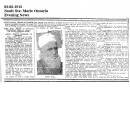Main menu
- ‘Abdu’l-Bahá’s Journey
- World Peace
- Stopping Racism in America
- Empowerment of Women
- More Principles...
- Prayer for America
After Forty Years in Prison, Bahá’í Leader Plans to Visit Followers in United States
AFTER FORTY YEARS IN PRISON, BAHAI LEADER PLANS TO VISIT FOLLOWERS IN UNITED STATES
‘Abdu’l-Bahá, Apostle of Universal Brotherhood, Seeks to Reconcile Various Religious Sects.
‘ABDU’L-BAHA’S MESSAGE TO EUROPE.
When ‘Abdu’l-Bahá left Europe for Egypt a month ago, he wrote the following farewell address to the people of England and France, whom he had wished:
“I bid a loving farewell to the people of France and England. I counsel them that they may day by day strengthen the bond of love and amity to this end — that they may become the sympathetic embodiment of one nation — that they may extend themselves to a universal brotherhood to guard and protect the interests and rights of all the nations of the east — that they may unfurl the divine banner of justice — that they may realize and treat each nation as a family composed of the individual children of God, and may know that in the sight of God the rights of all are equal.
“For all of us are children of one Father. God is at peace with all His children: why should they engage in strife and warfare among themselves?”
On August 31, 1868, a young religious teacher was locked in a prison in the Turkish fortress town of Akka, on the coast of Syria. He had displeased the servants of ‘Abdul Hamid.
On August 31, 1908, precisely 40 years after he was incarcerated, this man, old and snowy-bearded, was released from his prison by the Young Turks.
When he was imprisoned the religious movement that he represented had but few adherents. Now its adherents are numbered by millions. When this old man, ‘Abdu’l-Bahá Abbas, head of the Bahá’í movement, comes to America in March, as he is now planning to do, he will be welcomed by thousands of American followers.
In some respects, the Bahá’í movement is the most remarkable of modern times. It isn’t a religion, in the sense that Christianity and Mohammedism and other faiths are religions. Its followers belong to many diverse sects, remaining Christian or Mohammedan or Brahmin as the case may be, and still being thorough going Bahá’ís. The foundation principle of the Bahá’í doctrine is universal brotherhood. It seeks to reflect the best of the various religions and to find a common ground for worship service for all mankind.
This movement began with the appearance of a prophet called “The Bam” (Door or Gate) who preached in Persia from 1844 to 1850, heralding a new leader of mankind.
In 1850 the “Báb” was executed and two years later Bahá’u’lláh proclaimed himself as the promised leader. He and his followers were exiled from place to place, till finally they were sent to Akka, where Bahá’u’lláh lived and taught in prison till his death in 1892.
‘Abdu’l-Bahá Abbas, the present leader of the movement, is the son of Bahá’u’lláh.
After his release from prison ‘Abdu’l-Bahá Abbas visited London and Paris where he made addresses on Christian harmony. He is now in Egypt, whence he will sail for America on March 1.
There are now Bahá’í assemblies in all the larger cities of the United States and centers in every nation of the world.
[picture caption: ‘Abdu’l-Bahá.]









